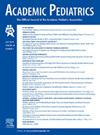Graduating Pediatric Residents’ Preparedness to Provide Mental Health Care for Children and Adolescents
IF 2.8
3区 医学
Q1 PEDIATRICS
引用次数: 0
Abstract
Objective
Examine graduating pediatric residents’ preparedness to provide mental health care and examine program characteristics and mental health training experiences associated with such preparedness.
Methods
National random sample of 1000 US pediatric residency graduates from the 2022 American Academy of Pediatrics Annual Survey of Graduating Residents; 428/991 (43.2%) responded. Residents rated how well their program prepared them (5-point scale, “poor” to “excellent”) to care for children and adolescents with mental and behavioral health needs overall and 8 specific problems. Respondents provided residency program characteristics and indicated whether their continuity clinic had an on-site mental health professional and if they completed a psychiatry rotation. Multivariable logistic regression examined program characteristics and mental health training experiences associated with reported preparedness (“excellent” or “very good”) to care for patients with mental health needs overall.
Results
More than half of residents (51.4%) reported feeling prepared to care for mental health needs overall. Six in 10 felt prepared to care for patients with suicidal ideation or behavior (64.8%), low mood or depression (64.1%), inattention and impulsivity (59.0%), anxiety (57.2%), and signs of eating disorders (56.9%). Fewer felt prepared to address disruptive behavior and aggression (37.9%) and substance use (34.0%). Sixty-one percent had an on-site mental health professional; one third completed a psychiatry rotation. Those who had both of these training experiences were most likely to report feeling prepared.
Conclusions
Gaps remain in residents’ preparedness to provide mental health care, particularly around substance use and disruptive behavior and aggression.
即将毕业的儿科住院医师为儿童和青少年提供心理健康护理的准备。
目的:检查即将毕业的儿科住院医师提供心理健康护理的准备情况,并检查与此类准备相关的项目特征和心理健康培训经验。方法:从2022年AAP年度毕业生调查中随机抽取1000名美国儿科住院医师毕业生;428/991(43.2%)回应。居民们评价了他们的项目对他们的准备程度(5分制,从“差”到“好”),以照顾有心理和行为健康需求的儿童和青少年,以及8个具体问题。受访者提供了住院医师计划的特点,并表明他们的连续性诊所是否有现场心理健康专业人员,以及他们是否完成了精神病学轮转。多变量逻辑回归检验了项目特征和心理健康培训经验与报告准备(“优秀”或“非常好”)有关,以照顾有心理健康需求的患者。结果:超过一半的居民(51.4%)报告说,他们准备好了照顾心理健康需求。十分之六的人认为准备好照顾有自杀意念或行为(64.8%)、情绪低落或抑郁(64.1%)、注意力不集中和冲动(59.0%)、焦虑(57.2%)和饮食失调迹象(56.9%)的患者。更少的人准备好解决破坏性行为和攻击(37.9%)和物质使用(34.0%)。61%的人有现场心理健康专家;三分之一完成了精神病学轮转。那些同时有过这两种训练经历的人最有可能报告感觉准备好了。结论:居民在提供精神卫生保健方面的准备仍然存在差距,特别是在物质使用和破坏性行为和攻击方面。
本文章由计算机程序翻译,如有差异,请以英文原文为准。
求助全文
约1分钟内获得全文
求助全文
来源期刊

Academic Pediatrics
PEDIATRICS-
CiteScore
4.60
自引率
12.90%
发文量
300
审稿时长
60 days
期刊介绍:
Academic Pediatrics, the official journal of the Academic Pediatric Association, is a peer-reviewed publication whose purpose is to strengthen the research and educational base of academic general pediatrics. The journal provides leadership in pediatric education, research, patient care and advocacy. Content areas include pediatric education, emergency medicine, injury, abuse, behavioral pediatrics, holistic medicine, child health services and health policy,and the environment. The journal provides an active forum for the presentation of pediatric educational research in diverse settings, involving medical students, residents, fellows, and practicing professionals. The journal also emphasizes important research relating to the quality of child health care, health care policy, and the organization of child health services. It also includes systematic reviews of primary care interventions and important methodologic papers to aid research in child health and education.
 求助内容:
求助内容: 应助结果提醒方式:
应助结果提醒方式:


